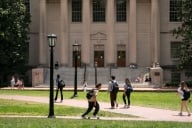You have /5 articles left.
Sign up for a free account or log in.
NORC, a research institute at the University of Chicago, released the results of a survey of 208 senior officers from science master’s and Ph.D. programs on the impact of COVID-19 on operations. Findings suggest that while science have been severely disrupted due to the pandemic, some aspects of COVID-19-era instruction and operations are here to stay. Some 82 percent of institutions represented anticipated expanding the number of graduate programs offered in a hybrid format, for instance.
Forty percent of the graduate schools represented had expanded their use of the holistic review processes during the admissions process in 2020. Much of the sample increased efforts to connect with graduate students. Major challenges for graduate students were reported to be international travel, due to both financial and travel restrictions. Students with faculty responsibilities were challenged, as well. And most institutions reported fewer job placements for graduates than usual.
Sixty-seven percent of science, technology, engineering and math research was delayed or continued due to COVID-19, according to the survey. Most institutions had some of their STEM labs open during the pandemic, but 14 percent were entirely shut down for some time. Just 18 percent of institutions were fully capable of supporting online learning.
"The COVID-19 pandemic is wreaking havoc on graduate students and their graduate programs. Our research both documents that disruption and highlights a host of strategies undertaken in response,” said Debra W. Stewart, senior fellow in the Higher Education Analytics Center at NORC and president emerita of the Council of Graduate Schools. “As damaging as this experience has been, our research suggests a potential silver lining. Innovations are underway as graduate schools struggle to meet their students’ needs. Some of these innovations, ranging from broader use of digital technology to new research laboratory practices, will definitely strengthen the graduate student experience across STEM fields.”
The American Educational Research Association and Spencer Foundation released a separate report on the impact of the pandemic on early-career scholars and doctoral students, based on findings from 12 focus groups (and 58 total participants) conducted in late May and early June. Topics covered include research impact, teaching, work-life balance, racism, career trajectories and uncertainties, institutional support and responses or lack thereof. Recommendations for institutions are providing more funding for material or “soft” support to emerging scholars, supporting caregivers, focusing on mentoring, investing in teaching, building community and connecting scholars, and acknowledging racism in academic settings and taking antiracist action. Framing the pandemic as an opportunity, the reports says it is “our great hope that institutions, and our field more broadly, might embrace this moment in ways that create important and needed changes in practices and policies that contribute to equitable and enriching places for early career scholars and doctoral students to work and thrive.”









